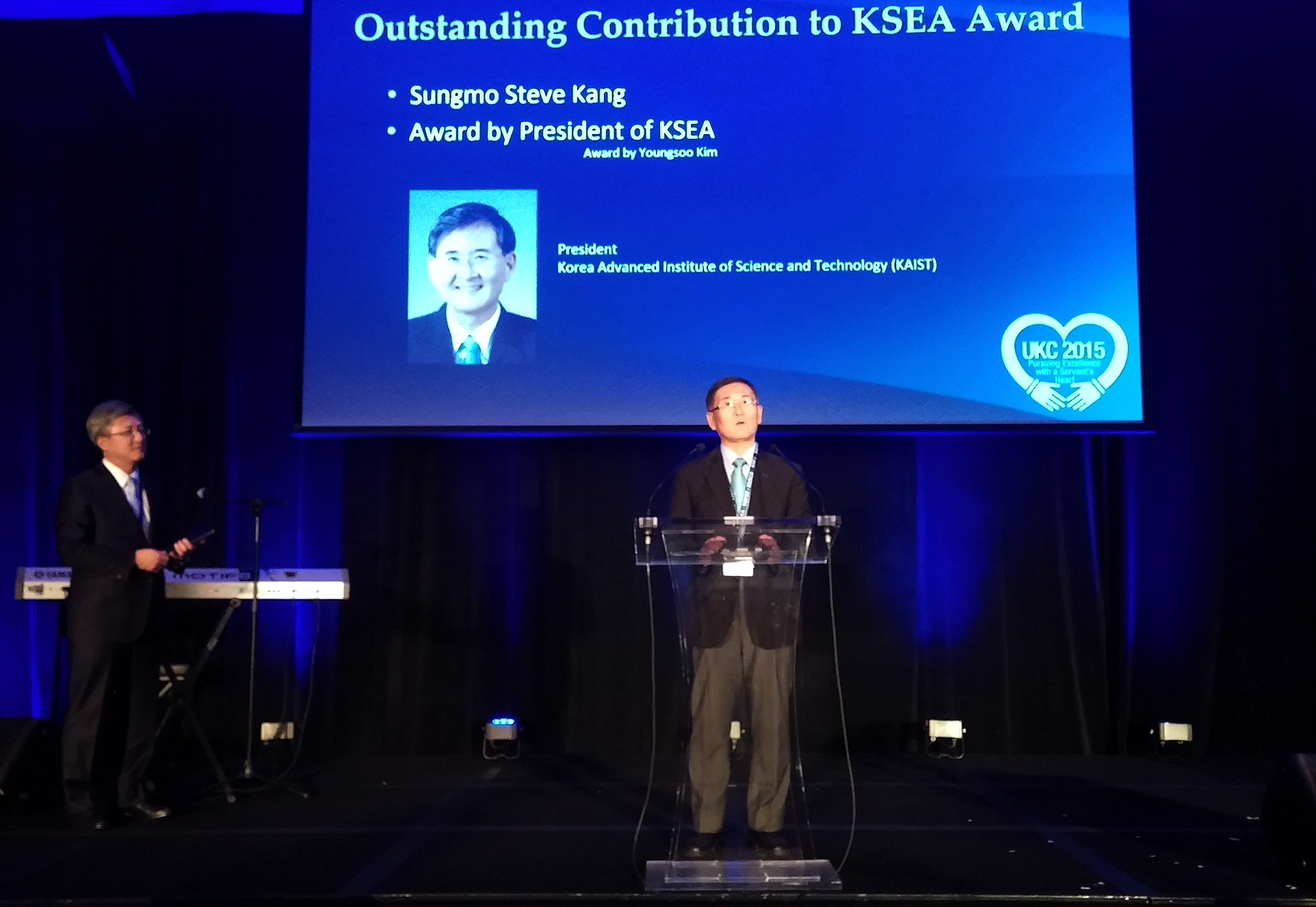people
The Korean-American Scientists and Engineers Association (KSEA), a non-profit Korean professional organization based in the United States with over 6,000 registered members, bestowed upon President Steve Kang of KAIST the 2015 Outstanding Contribution Award.
The award is presented to a person who has made significant contributions to the development of KSEA.
The award ceremony took place during the 2015 US-Korea Conference on Science, Technology, and Entrepreneurship (UKC), which was held on July 30, 2015, at the Hyatt Regency Hotel in Atlanta, Georgia.
The UKC is the flagship conference of KSEA, which takes place every year, and covers science, engineering, technology, industry, entrepreneurship, and leadership. It attracts more than 1,200 participants from the US and Korea. The UKC 2015 was held on July 29-August 1, 2015.
President Kang has participated in UKC conferences over the past few years as a plenary speaker, addressing major issues in science and technology for both nations, and provided generous support for the activities of UKC and KSEA. He also promoted discussions and exchanges of professional knowledge in his field, microelectronics, by organizing fora and symposia.
He addressed the UKC 2015 as a plenary speaker with a speech entitled “Pursuing Excellence with a Servant’s Heart.” President Kang said that good leadership should bring out synergistic contributions from all constituents and achieve excellence under all circumstances. He mentioned one example of good leadership, known as humble leadership, and explained how such leadership played an important role in the development of scientific breakthroughs, such as the world’s premier high-end microprocessor chip sets first produced by his team under extremely high pressure.

-
research KAIST Develops Customized Tactile Sensor That Can Detect Light Breath, Pressure and Sound
< Photo 1. (From left) Professor Inkyu Park of KAIST Department of Mechanical Engineering (ME), Dr. Jungrak Choi of ETRI, Ph.D. Candidate Donho Lee and M.S. Graduate Chankyu Han of KAIST ME > When a robot grabs an object or a medical device detects a pulse, the tactile sensor is the technology that senses pressure like a fingertip. Existing sensors had disadvantages, such as slow responses or declining accuracy after repeated use, but Korean researchers have succeeded in developing a
2025-06-23 -
people Distinguished Professor Sang Yup Lee Wins 2025 Global Metabolic Engineering Award
< Distinguished Professor Sang Yup Lee (Senior Vice President for Research) from the Department of Chemical & Biomolecular Engineering > KAIST announced on the 20th that Professor Sang Yup Lee, who serves as the Vice President for Research and a Distinguished Professor at our university, has been awarded the '2025 Gregory N. Stephanopoulos Award for Metabolic Engineering' by the International Metabolic Engineering Society (IMES). Professor Lee delivered his award lecture at the 16
2025-06-20 -
research KAIST Develops Glare-Free, Heat-Blocking 'Smart Window'... Applicable to Buildings and Vehicles
• Professor Hong Chul Moon of the Department of Chemical and Biomolecular Engineering develops RECM, a next-generation smart window technology, expecting cooling energy savings and effective indoor thermal management. • When using the developed RECM, a significantly superior temperature reduction effect is observed compared to conventional windows. • With a 'pedestrian-friendly smart window' design that eliminates glare by suppressing external reflections, it is expected to be a
2025-06-20 -
research High-Resolution Spectrometer that Fits into Smartphones Developed by KAIST Researchers
- Professor Mooseok Jang's research team at the Department of Bio and Brain Engineering develops an ultra-compact, high-resolution spectrometer using 'double-layer disordered metasurfaces' that generate unique random patterns depending on light's color. - Unlike conventional dispersion-based spectrometers that were difficult to apply to portable devices, this new concept spectrometer technology achieves 1nm-level high resolution in a device smaller than 1cm, comparable in size to a fingernail
2025-06-13 -
research KAIST Turns an Unprecedented Idea into Reality: Quantum Computing with Magnets
What started as an idea under KAIST’s Global Singularity Research Project—"Can we build a quantum computer using magnets?"—has now become a scientific reality. A KAIST-led international research team has successfully demonstrated a core quantum computing technology using magnetic materials (ferromagnets) for the first time in the world. KAIST (represented by President Kwang-Hyung Lee) announced on the 6th of May that a team led by Professor Kab-Jin Kim from the Department of P
2025-06-12